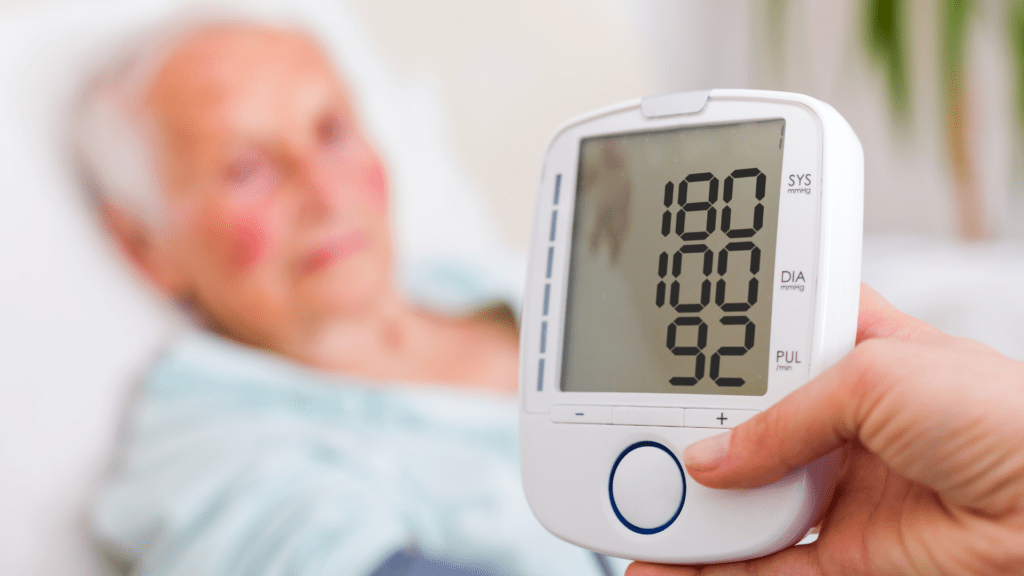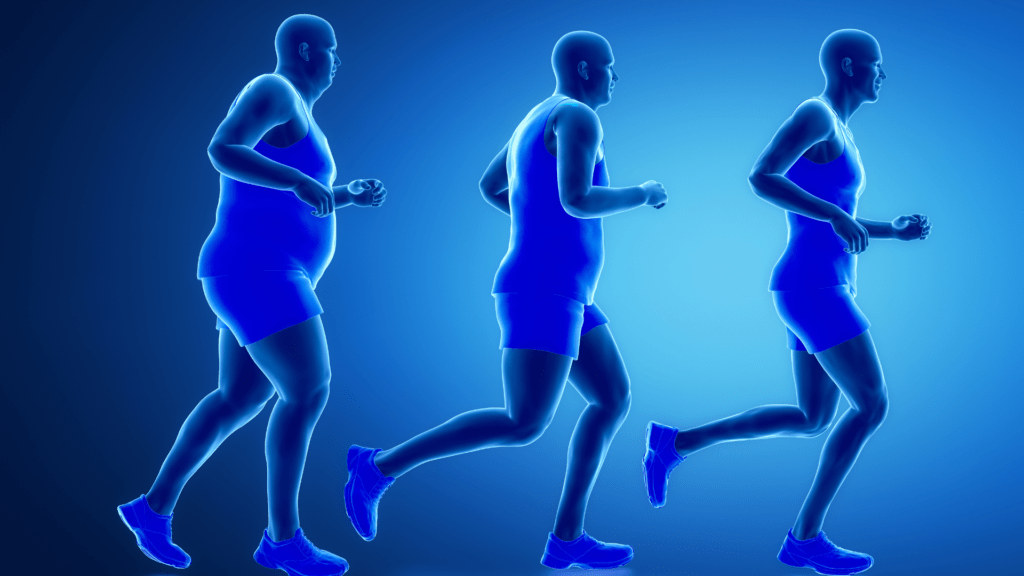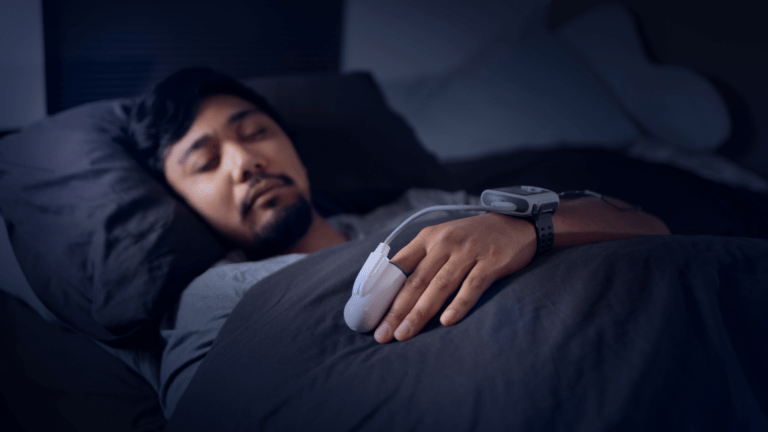Most people believe that sleep is just a time for the body to rest, but it’s much more than that. It’s a crucial part of your overall health, especially when it comes to managing blood pressure and maintaining a healthy weight. While many think that lack of sleep only makes you feel tired, the real damage goes deeper than that. If you’ve ever wondered, “Can lack of sleep cause high blood pressure?”, the answer might surprise you.

Sleep plays a vital role in regulating various body functions, including your cardiovascular system. When you don’t get enough sleep, your body reacts in ways that may lead to high blood pressure, or even make it worse if you already have it. At the same time, poor sleep can mess with your metabolism, making it harder to lose weight and even easier to gain it. In this blog, we’ll explore how lack of sleep can impact both your blood pressure and your weight, focusing on “Can lack sleep cause high blood pressure” and “How does sleep affect weight loss”.
Can Lack of Sleep Cause High Blood Pressure?
Yes, lack of sleep can lead to high blood pressure by disrupting the body’s ability to regulate stress hormones. Over time, sleep deprivation puts extra strain on your heart, increasing the risk of hypertension. Chronic sleep deprivation may also impair the body’s natural ability to lower blood pressure at night, further contributing to long-term cardiovascular issues.
The Link Between Sleep and Blood Pressure
The idea that your sleep can affect your blood pressure might sound odd, but science says it’s true. When you sleep, your body goes through various stages of rest and recovery. During deep sleep, your heart rate slows down, and your blood pressure naturally lowers. This is the body’s way of repairing itself and maintaining balance. But what happens when you don’t get enough sleep? Can lack of sleep raise blood pressure? Absolutely.
How Sleep Deprivation Leads to High Blood Pressure
Here’s how it works: When you’re sleep-deprived, your body stays in a state of alertness, similar to being stressed. This triggers the release of stress hormones like cortisol, which make your heart pump faster and your blood vessels tighten. Over time, this can lead to high blood pressure, also known as hypertension. The less sleep you get, the more these stress hormones build up, leading to long-term health problems.
So, if you’ve been wondering, “Can sleep deprivation cause high blood pressure?” or “Can sleeplessness cause high blood pressure?” the answer is yes. Even just a few nights of poor sleep can have a noticeable impact. Studies have shown that people who regularly sleep fewer than six hours a night are at a higher risk of developing hypertension.
How Much Does Lack of Sleep Raise Blood Pressure?
The amount of sleep you miss can have a direct effect on how much your blood pressure rises. You might ask, “How much does lack of sleep raise blood pressure?” or “Can elevated blood pressure at night be caused by lack of sleep?” The simple answer is, that even missing just a couple of hours of sleep can make a difference.
The Long-Term Effects of Sleep Deprivation on Blood Pressure
When you lose sleep, your body’s ability to regulate hormones and maintain a healthy heart rhythm is disrupted. This leads to elevated blood pressure at night, which might carry over into the daytime as well. The impact isn’t just temporary. Chronic sleep deprivation can cause lasting damage to your cardiovascular system. If you’re someone who frequently pulls all-nighters or suffers from insomnia, you could be putting yourself at risk of developing hypertension down the line.
It’s not just about the quantity of sleep either. The quality of your sleep matters just as much. If you’re waking up frequently during the night, your body isn’t getting the deep, restorative sleep it needs. As a result, you could still experience higher blood pressure levels, even if you think you’re getting enough hours of sleep. So, can lack of sleep cause high blood pressure? This is why addressing issues like sleep apnea or other sleep disorders is so important for managing your blood pressure.
Can No Sleep Cause High Blood Pressure?
In extreme cases, missing a night of sleep altogether can have immediate effects on your blood pressure. You might have asked yourself, “Can no sleep cause high blood pressure?” The answer is a resounding yes. Staying up all night places an immense amount of strain on your heart. With no time for your body to rest and recover, your blood pressure stays elevated, putting you at risk for serious health issues like heart disease and stroke.

So, whether you’re pulling an all-nighter for work or because you can’t fall asleep, it’s crucial to understand how lack of sleep can cause high blood pressure. It’s not just one sleepless night that could be a problem—repeated nights of no sleep can lead to chronic hypertension, making it even harder to manage over time. That’s why prioritizing sleep is essential, no matter how busy life gets.
Does High Blood Pressure Cause Insomnia?
It’s a common belief that high blood pressure only affects your heart and blood vessels, but can it mess with your sleep? Many people don’t connect the two, but yes, high blood pressure can cause insomnia. If you’ve ever asked yourself, “Can high blood pressure cause insomnia?” the answer is more complicated than you might think.
The Connection Between High Blood Pressure and Insomnia
When your blood pressure is elevated, your body is under constant stress. This can make it hard to relax enough to fall asleep. Over time, high blood pressure can cause physical discomfort, such as headaches or chest pain, which keeps you awake. It also triggers your brain to remain alert, even when you’re trying to wind down. If you’ve ever felt restless, tossing and turning at night, high blood pressure could be a contributing factor.
But it doesn’t stop there. Insomnia caused by high blood pressure creates a vicious cycle. When you’re not getting enough rest, your body struggles to regulate blood pressure, making the problem worse. Lack of sleep leads to higher levels of stress hormones, which in turn raises your blood pressure even more. This back-and-forth cycle can leave you stuck in a pattern of insomnia and high blood pressure.
Why High Blood Pressure Disrupts Sleep Patterns
One reason high blood pressure can disrupt your sleep is because it places additional strain on your heart. When your heart is working overtime, it’s harder for your body to fully relax. This is especially true if your blood pressure tends to spike at night, known as elevated blood pressure at night. If your heart is pumping harder when you’re supposed to be resting, it’s no wonder that you’re struggling to sleep.
Another factor is anxiety. Many people with hypertension experience heightened levels of anxiety, which can further disrupt sleep patterns. You might lie awake worrying about your health, or simply be unable to calm down enough to sleep. In this way, high blood pressure and sleep are intricately linked.
How to Break the Cycle of High Blood Pressure and Insomnia
The key to breaking the cycle of insomnia and high blood pressure is to focus on both problems at once. Managing your blood pressure through lifestyle changes or medication can help reduce the physical symptoms that are keeping you awake. At the same time, adopting healthy sleep habits can help lower your blood pressure naturally. It’s all about finding balance.
Making sure you get enough sleep can help your body regulate blood pressure better. Studies show that practicing good sleep hygiene—like going to bed at the same time every night, avoiding caffeine late in the day, and creating a relaxing bedtime routine—can make a significant difference in both your sleep and your heart health.
Does Lack of Sleep Cause Weight Gain?
Most people assume that weight gain is all about what you eat and how much you exercise, but there’s another key player: sleep. While many people don’t realize it, a lack of sleep can make it much harder to maintain or lose weight. So if you’re wondering, “Does lack of sleep cause weight gain?” the answer is yes, and here’s why.

How Sleep Affects Your Metabolism
Your body’s ability to burn calories and process food is directly tied to how well you sleep. When you don’t get enough sleep, your metabolism slows down. This means that your body stores more fat instead of burning it for energy. Plus, lack of sleep affects your hormones, particularly those that regulate hunger. Sleep deprivation leads to a decrease in leptin (the hormone that tells you you’re full) and an increase in ghrelin (the hormone that makes you feel hungry). This combination means you’re more likely to overeat and choose unhealthy foods when you’re tired.
So, if you’ve been asking yourself, “Can lack of sleep cause weight gain?” or “Can sleep deprivation cause weight gain?” the answer is yes. Even just one night of poor sleep can mess with your hunger hormones, leading to cravings and overeating. And over time, this can result in noticeable weight gain.
Why Does Lack of Sleep Make You Crave Junk Food?
It’s no coincidence that when you’re sleep-deprived, you tend to reach for sugary or fatty foods. Lack of sleep not only makes you hungrier but also affects the way your brain responds to food. Studies show that when you’re tired, the reward centers in your brain become more active, especially when you’re exposed to high-calorie foods. This makes it much harder to resist junk food, leading to overeating.
This explains why you might wake up after a bad night’s sleep and crave a donut instead of something healthy. Your brain is wired to seek out quick sources of energy when it’s tired, which is why lack of sleep can make you gain weight if it becomes a regular pattern. In other words, when you’re sleep-deprived, your ability to make healthy choices is compromised.
Can Sleeping Help You Lose Weight?
On the flip side, getting enough sleep can help you lose weight. If you’ve ever wondered, “Can sleep help you lose weight?” or “Do you lose weight when you sleep?” the answer is yes! When you sleep, your body is still burning calories, and getting a good night’s rest helps regulate the hormones that control your appetite.

Sleeping more also helps lower stress levels, which can prevent emotional eating. Plus, when you’re well-rested, you’re more likely to have the energy to exercise and make healthier food choices throughout the day. So, in a way, sleeping can be a key part of your weight loss plan.
In short, sleep and weight loss are closely connected. Prioritizing good sleep hygiene can boost your metabolism, reduce cravings, and help you reach your weight loss goals faster. So, if you’ve been struggling to lose weight, try focusing on your sleep habits and see how it impacts your progress.
Does Lack of Sleep Cause High Blood Pressure?
There’s a widespread belief that sleep has little effect on our heart health, but the truth is, that lack of sleep can significantly impact your blood pressure. You may not immediately connect sleepless nights with high blood pressure, but the relationship between the two is clear. Let’s break it down.
The Science Behind Sleep and Blood Pressure
When you sleep, your body uses this time to repair itself, and one of the things it regulates is your blood pressure. As you rest, your blood pressure naturally drops, allowing your heart and blood vessels to relax. But when you don’t get enough sleep, your body doesn’t have enough time to lower your blood pressure. Over time, this can lead to elevated blood pressure during the day.
Studies have shown that even one night of poor sleep can cause a temporary spike in blood pressure, and over time, chronic sleep deprivation can result in long-term high blood pressure, or hypertension. So, if you’re wondering, “Can lack of sleep cause high blood pressure?” or “Does sleep deprivation raise blood pressure?” the answer is a resounding yes.
How Much Does Lack of Sleep Raise Blood Pressure?
You might be asking, “How much does lack of sleep raise blood pressure?” The answer depends on how severe your sleep deprivation is. Studies suggest that consistently getting less than six hours of sleep per night can significantly increase your risk of high blood pressure. Those who regularly sleep less than this are more likely to develop hypertension compared to those who get a full night’s rest.
For those dealing with elevated blood pressure at night, the issue becomes even more critical. If your blood pressure doesn’t drop during sleep (a phenomenon known as non-dipping), you’re at an even higher risk of heart disease, stroke, and other cardiovascular problems.
Why Does Lack of Sleep Raise Blood Pressure?
Lack of sleep raises your blood pressure by disrupting the balance of stress hormones in your body. When you don’t get enough rest, your body produces more cortisol, a hormone that increases your heart rate and narrows your blood vessels. This leads to higher blood pressure, especially if you’re missing sleep consistently. So, if you’ve been asking, “Can lack of sleep increase blood pressure?” or “Does sleep affect blood pressure?” now you know why.

Additionally, lack of sleep affects the way your body regulates other hormones like insulin, which can also contribute to high blood pressure. Insulin resistance, often linked to sleep deprivation, can lead to increased blood sugar levels, which can damage blood vessels and further elevate blood pressure.
Breaking the Cycle of Sleeplessness and High Blood Pressure
The relationship between sleep and blood pressure is a two-way street. High blood pressure can make it hard to sleep, and lack of sleep can raise your blood pressure even more. Breaking this cycle is essential for your health. To improve your sleep and lower your blood pressure, consider lifestyle changes such as:
- Establishing a regular sleep schedule
- Reducing caffeine and alcohol intake
- Practicing relaxation techniques like meditation
- Creating a peaceful sleep environment
By improving your sleep habits, you can help reduce your risk of high blood pressure and improve your overall heart health.
Can Lack of Sleep Cause Weight Gain?
Another common misconception is that weight gain is solely caused by overeating and lack of exercise. But did you know that lack of sleep plays a major role in weight gain too? If you’ve been struggling with your weight and wondering, “Does lack of sleep cause weight gain?” the answer is yes!
How Sleep Deprivation Affects Your Weight
When you don’t get enough sleep, your body experiences hormonal changes that make it more likely to gain weight. Specifically, your levels of ghrelin, the hormone that makes you feel hungry, go up, while your levels of leptin, the hormone that signals fullness, go down. This imbalance leads to increased hunger and overeating, particularly cravings for high-calorie, sugary foods. So, if you’ve been asking yourself, “Does sleep deprivation cause weight gain?” this hormonal disruption is one reason why.
Lack of sleep also slows down your metabolism. When you’re tired, your body doesn’t process carbohydrates as efficiently, which can lead to increased fat storage. Over time, this can result in weight gain, even if you’re not eating more than usual.
Why Does Lack of Sleep Make You Gain Weight?
Beyond hormonal imbalances, lack of sleep also affects your behavior. When you’re sleep-deprived, you’re less likely to have the energy to exercise, and more likely to reach for unhealthy snacks as a quick energy fix. This combination of reduced activity and increased calorie intake can quickly lead to weight gain. So, if you’ve ever wondered, “Can no sleep cause weight gain?” or “Does not sleeping make you gain weight?” the answer lies in both your hormones and your behavior.
It’s also worth mentioning that sleep deprivation increases your stress levels, which can trigger emotional eating. Many people turn to food as a way to cope with stress, and if you’re not getting enough sleep, you’re more likely to overeat and make poor food choices.
How Much Weight Can You Gain from Lack of Sleep?
You might be wondering, “How much weight can you gain from lack of sleep?” While the exact amount varies from person to person, research suggests that people who get less than six hours of sleep per night are more likely to have a higher body mass index (BMI). This means that chronic sleep deprivation can gradually lead to noticeable weight gain over time. So, if you’re trying to lose weight, focusing on getting more sleep could be a crucial part of your plan.
Can Sleeping Help You Lose Weight?
If you’re trying to lose weight, getting enough sleep is just as important as eating right and exercising. Studies show that people who get at least seven to eight hours of sleep per night are more likely to maintain a healthy weight. So, if you’ve been asking, “Can sleep help you lose weight?” the answer is yes!
Sleep and weight loss are closely connected because adequate sleep helps regulate your metabolism, reduce cravings, and give you the energy to stay active during the day. Some studies suggest that those who are well-rested tend to lose more weight than those who are sleep-deprived, even when both groups are following the same diet and exercise routine.
It’s also true that your body burns calories while you sleep. So, if you’ve ever wondered, “Do you lose weight when you sleep?” or “Can you lose weight while sleeping?” the answer is yes, but it’s about more than just the calories burned during rest. Getting enough sleep ensures that your body is functioning optimally, which helps you maintain a healthy weight in the long run.
In conclusion, prioritizing sleep is crucial for preventing weight gain and supporting weight loss efforts. Getting enough sleep, can reset your hormones, boost your metabolism, and make healthier daily choices.



